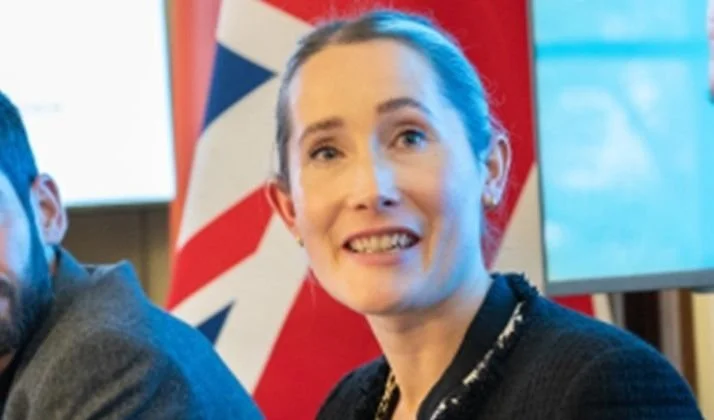Reflections on Q&A session with Lucinda Stallard (Foreign, Commonwealth and Development Office)
On 21st November, I had the privilege to attend a Q&A session with Lucinda Stallard, the Foreign, Commonwealth and Development Office lawyer and diplomat, and an alumna of the UofG School of Law, for a Q&A session. We had a chat about pursuing a career in international law and how she built her career after her time in UofG.
Lucinda is a senior lawyer in the Foreign, Commonwealth and Development Office. She has recently returned from a posting with the FCDO, where she served as the Legal Counsellor (International Law) to the UK Mission in Geneva for three years, focusing on human rights, humanitarian, disarmament, health and migration. In other roles, she has worked as a lawyer in the Department for Exiting the EU during the negotiation of the UK-EU Withdrawal Agreement, and in the constitutional law team in the Scottish Government during the run up to the Scottish Independence referendum. She is a former University of Glasgow Law School student (LLB and Diploma) and has recently completed an LLM in international law at UCL, studying alongside work.
During the event, she mentioned how she clicked a lot more with the international law subjects in her Honours courses, compared to the compulsory modules in the first two years of her undergraduate degree. She added that her experience in her year abroad and part-time jobs contributed to her decision in pursuing a career in international law. We talked about the summer placements in the government and how they can be helpful in building a career in international law. Lucinda also talked about government traineeships, and how they can contribute to a grounding in public law, which is essential for a career in international law.
She pointed out the differences between her current job and her previous work in Geneva, which was much more hands-on and more direct exposure to law. As a senior lawyer in the FCDO, she is currently advising the UK position on the UNSC and UNGA resolutions, and the impacts of the ICJ judgments/advisory opinions. She also talked about the dynamic work in the Foreign Office, and how she deals with something different every day.
She emphasised trying out different things, having hobbies, and being a well-rounded person, having an interest in what is going on around the world, and how these can be useful and impressive in the interviews. She mentioned that it is good to know what you like, but also what you don’t like, underlying the misconceptions about knowing what you want to do from the very beginning. She highlighted that there is always something to get from all the experiences, and the importance of taking the opportunities on the way.
She discussed the diversity issues and her experiences as a woman in international law. She talked about how representation in the UK has been improving and it is a lot more diverse than it used to be. However, she mentioned how the UN is less diverse, and it can
be challenging to see some States’ opinions on representation and diversity. Lucinda also mentioned working in gender equality in the UN and how it was frustrating to see certain States’ approach and opinions on that. She commented on office housework being an expectation mostly from women in the workplace, highlighting the importance of considering the substantive work you need to do before taking on more, and being aware of how much you can take on.
Moreover, Lucinda advised us on how to get into international law, stating that working in the government is one way of doing it, but there are other ways. She said there is a lot of people coming from private law backgrounds as well as public law backgrounds in the Foreign Office. She emphasised that a strong public law knowledge is essential to work in international law. We discussed the importance of doing research and networking, meeting new people, and how they are crucial to find external jobs. She said looking out for jobs is mainly how you get jobs abroad such as the UK Mission in Geneva.
In addition, we talked about imposter syndrome, and her experiences with it, which led her to the masters degree. Many people in the Foreign Office have postgraduate degrees, however, it is not a requirement. At this point, she underlined the importance of practical experience, and how it can be more valuable. On the other hand, a masters degree is more likely to be needed for a career in the UN. Similarly, speaking multiple languages can be beneficial, and sometimes a requirement for the UN. Another advice of Lucinda was that it is good to have a masters degree for a wider career, but not a requirement for all career pathways.
Finally, we discussed moving abroad constantly and how it is not a requirement, but mostly an expectation when you do international law. Additionally, she said you can have a lot more autonomy on where you move when working in the government, compared to the external jobs or Foreign Office. She mentioned how it can be very exciting to move and see how you create a life in other places in the world. She also talked about the downsides, and the weird feeling of handing over your flat and your life abroad to someone else when your legal post ends there, since there are no extensions on the posts. She said it can be tricky leaving your family and friends but rewarding to meet so many people and experience different things. To sum up, it was a very useful Q&A session for all of us, Lucinda was very helpful with her advice and tips for the students who want to go into international law.
~ Beste Yasav (International Law LLM student)


